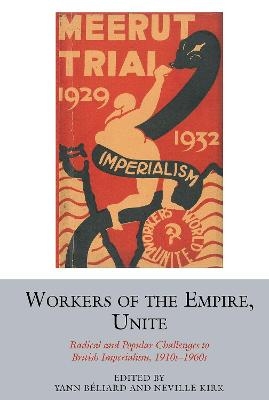
Workers of the Empire, Unite
Liverpool University Press (Verlag)
978-1-80085-968-5 (ISBN)
- Lieferbar
- Versandkostenfrei
- Auch auf Rechnung
- Artikel merken
How central was the intervention of the metropolitan Left in the liquidation of the British Empire? Were labour mobilisations in the colonies only stepping stones for bourgeois nationalists? To what extent were British labour activists willing and able to form connections with colonial workers, and vice versa? Here are some of the complex questions on which this volume sheds new light.
Though convergences were fragile and temporary, this book recapture the sense of uncertainty that accompanied the final decades of the British Empire, a period when radical minorities hoped that coordinated efforts across borders might lead not only to the destruction of the British Empire but to that of capitalism and imperialism in general.
Exploiting rare primary sources and adopting a resolutely transnational approach, our collection makes an original contribution to both labour history and imperial studies.
Yann Béliard is a Senior Lecturer in British Studies, Université Sorbonne Nouvelle – Paris 3. Neville Kirk is Emeritus Professor of Labour and Social History at Manchester Metropolitan University. His publications include Labour and Society in Britain and the USA (1994), Comrades and Cousins (2003), Custom and Conflict in 'The Land of the Gael' (2007, 2009) and Labour and the Politics of Empire (2011, 2014). He is editor of Liverpool University Press's series Studies in Labour History and a member of the executive committee of the UK Society for the Study of Labour History.
Notes on contributorsList of abbreviationsList of illustrations
Foreword: Paul Pickering (Australian National University)Introduction: Yann Béliard (Sorbonne Nouvelle University), Labour, empire and decolonisation: historiographical landmarks
PART 1 – Contesting Imperialism (1910s-1950s)
Chapter 1: Marie Terrier (CREW, Sorbonne Nouvelle University), Annie Besant’s fight for Home Rule in India, 1910s-1920sChapter 2: Yann Béliard (Sorbonne Nouvelle University), Sylvia Pankhurst vs. the British Empire: the Workers’ Dreadnought experience, 1917 1924Chapter 3: Nicholas Owen (University of Oxford), Alliances from above and below: the failures and successes of communist anti-imperialism in India, 1920 1934Chapter 4: Matt Perry (Newcastle University), ‘The Lingua Franca of the Bangle’: Ellen Wilkinson, the Indian nationalist movement and British Labour, 1932Chapter 5: Quentin Gasteuil (Ecole normale supérieure Paris-Saclay (ENS) / Sorbonne University), A comparative and transnational approach to socialist anti-colonialism: the Fenner Brockway – Marceau Pivert connection, 1930s-1950s
PART 2 – Labour, Decolonisation and Independence (1940s-1960s)
Chapter 6: Gareth Curless (University of Exeter), Decolonisation and claim making in the Sudan, c. 1945-1958Chapter 7: Tom Sibley (International Centre for Trade Union Rights, ICTUR), Class, Cold War and colonialism: the deportation of Albert Fava from Gibraltar to Britain, 1948Chapter 8: David Hyde (University of East London), Decolonisation and ‘Development Untoward’: crisis and conflict on Kenya’s tea plantations, 1959-1960Chapter 9: Evan Smith (Flinders University of South Australia), For socialist revolution or national liberation? Anti-colonialism and the Communist Parties of Great Britain, Australia and South Africa in the era of decolonisation
Conclusion: Neville Kirk (Manchester Metropolitan University), Eight points on labour and the end of the British EmpireAfterword: Yann Béliard (Sorbonne Nouvelle University), Towards a people’s history of British decolonisationBibliographyIndex
| Erscheinungsdatum | 06.04.2021 |
|---|---|
| Reihe/Serie | Studies in Labour History ; 15 |
| Verlagsort | Liverpool |
| Sprache | englisch |
| Maße | 163 x 239 mm |
| Themenwelt | Geschichte ► Teilgebiete der Geschichte ► Wirtschaftsgeschichte |
| ISBN-10 | 1-80085-968-6 / 1800859686 |
| ISBN-13 | 978-1-80085-968-5 / 9781800859685 |
| Zustand | Neuware |
| Haben Sie eine Frage zum Produkt? |
aus dem Bereich


